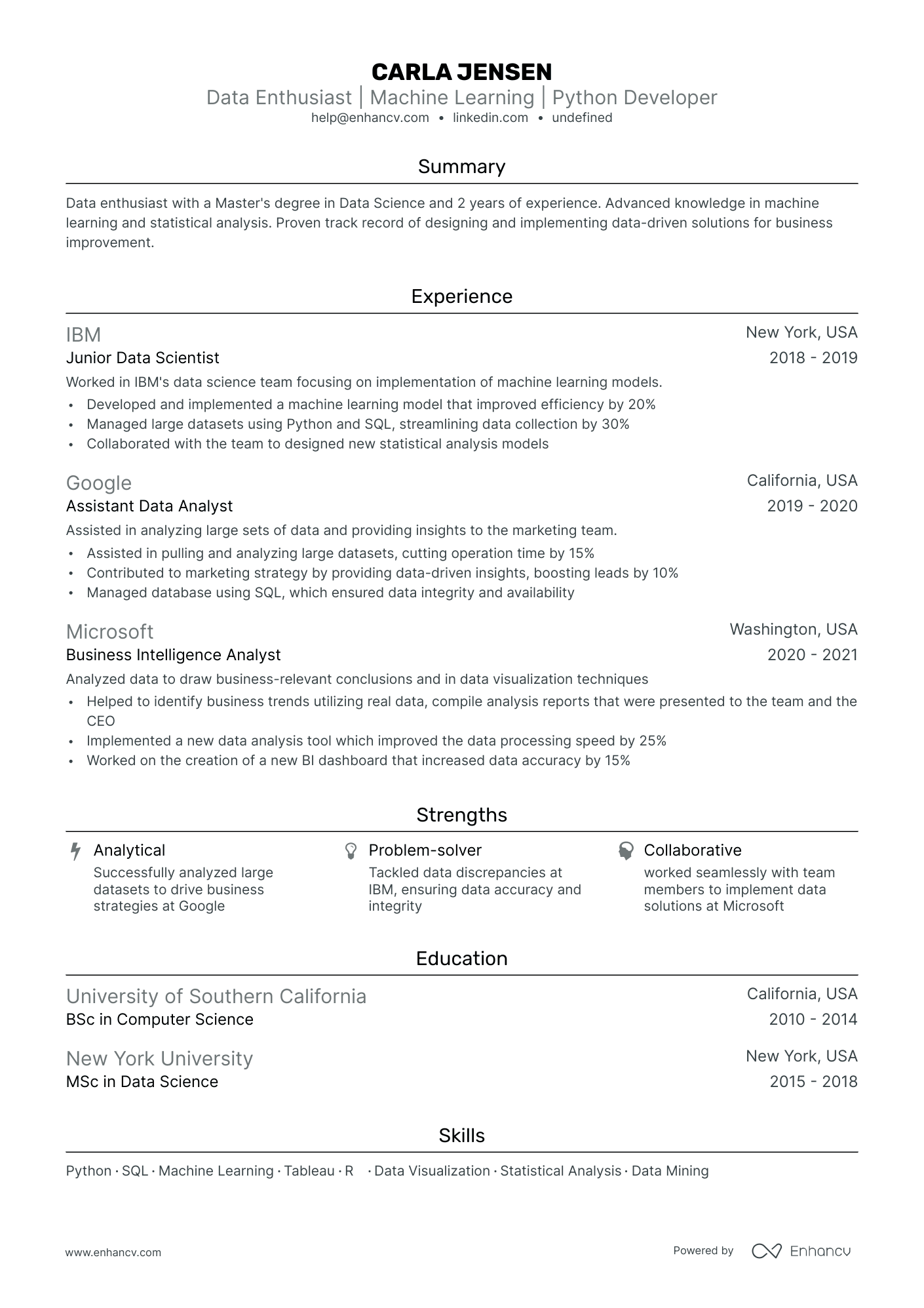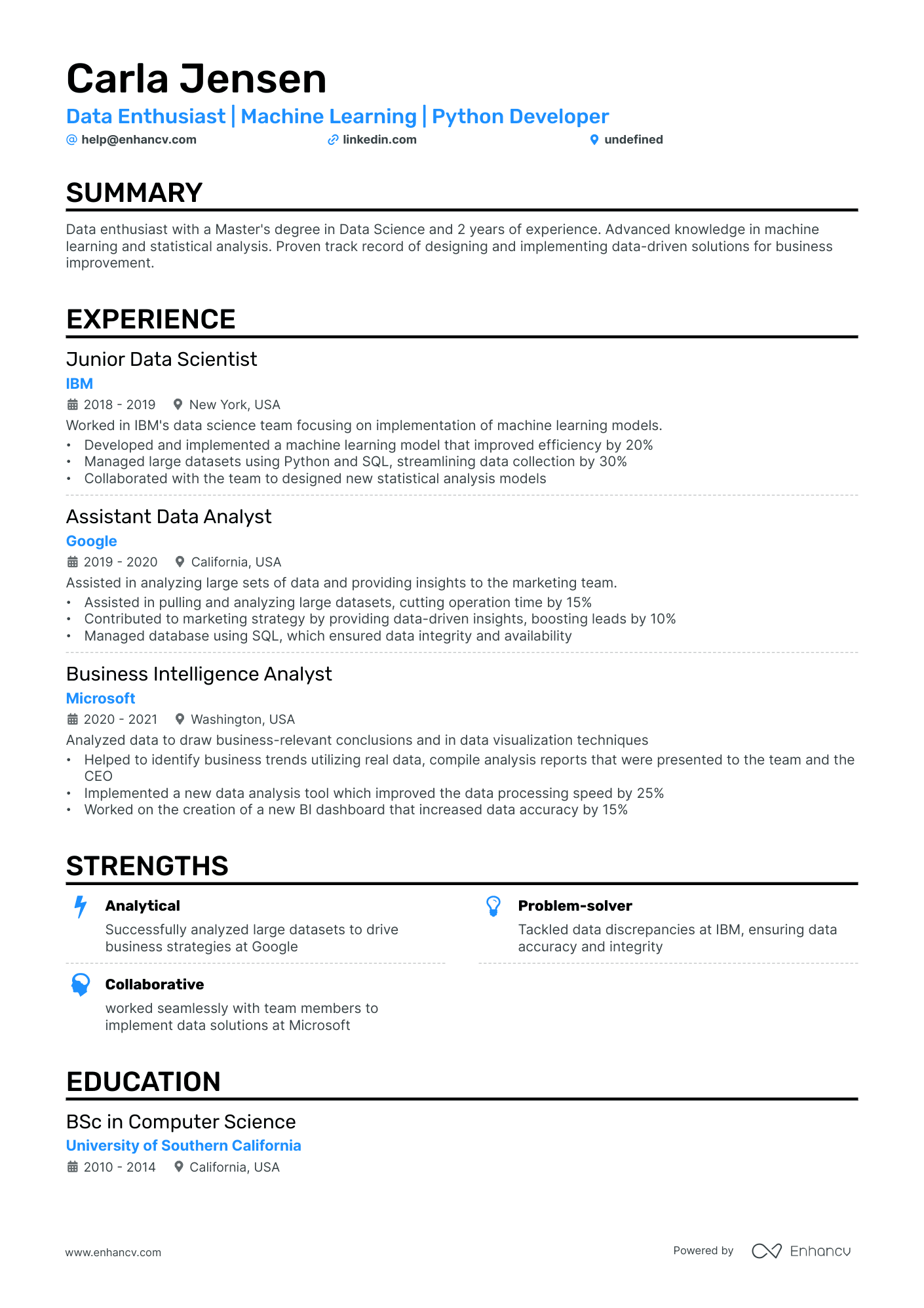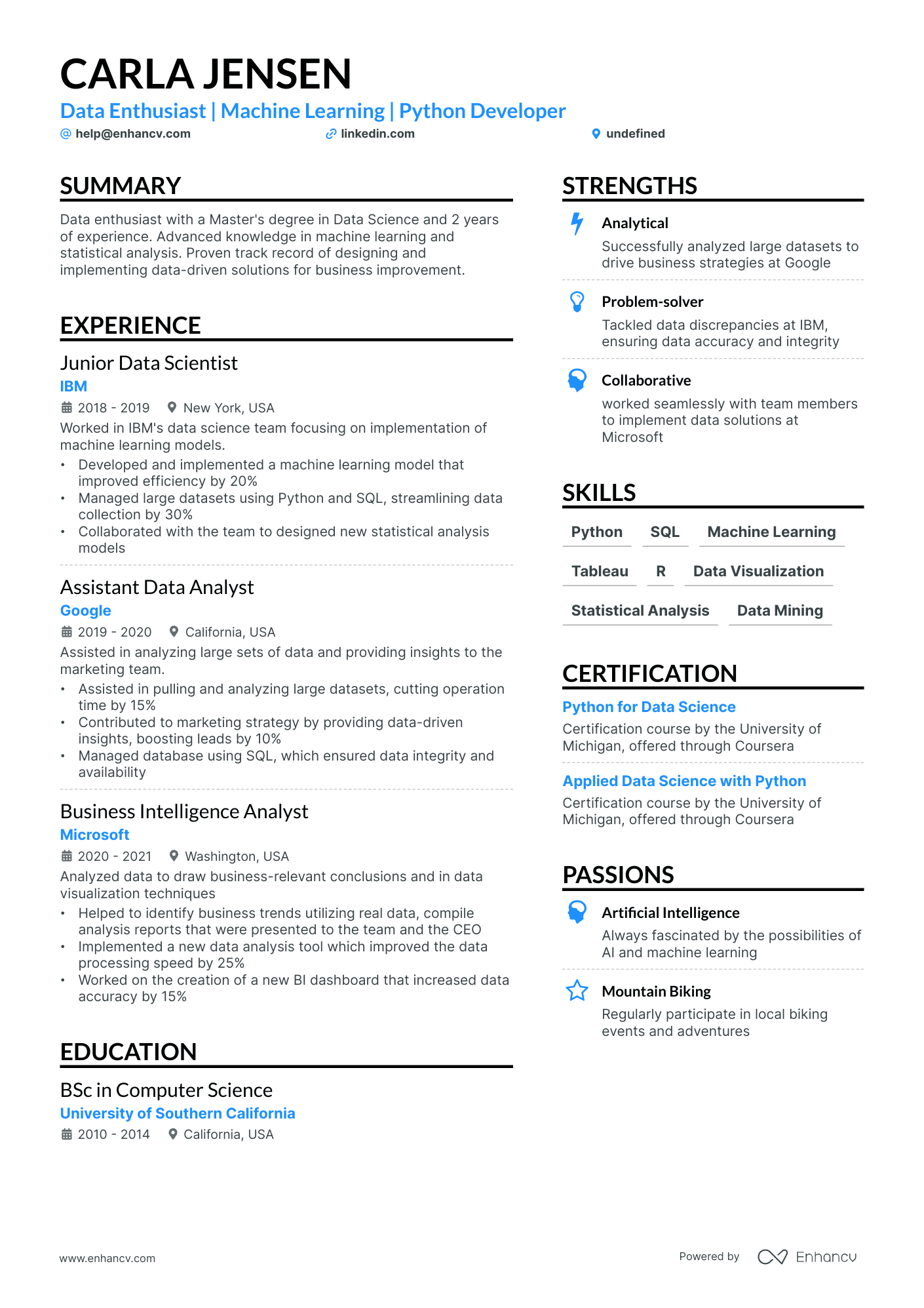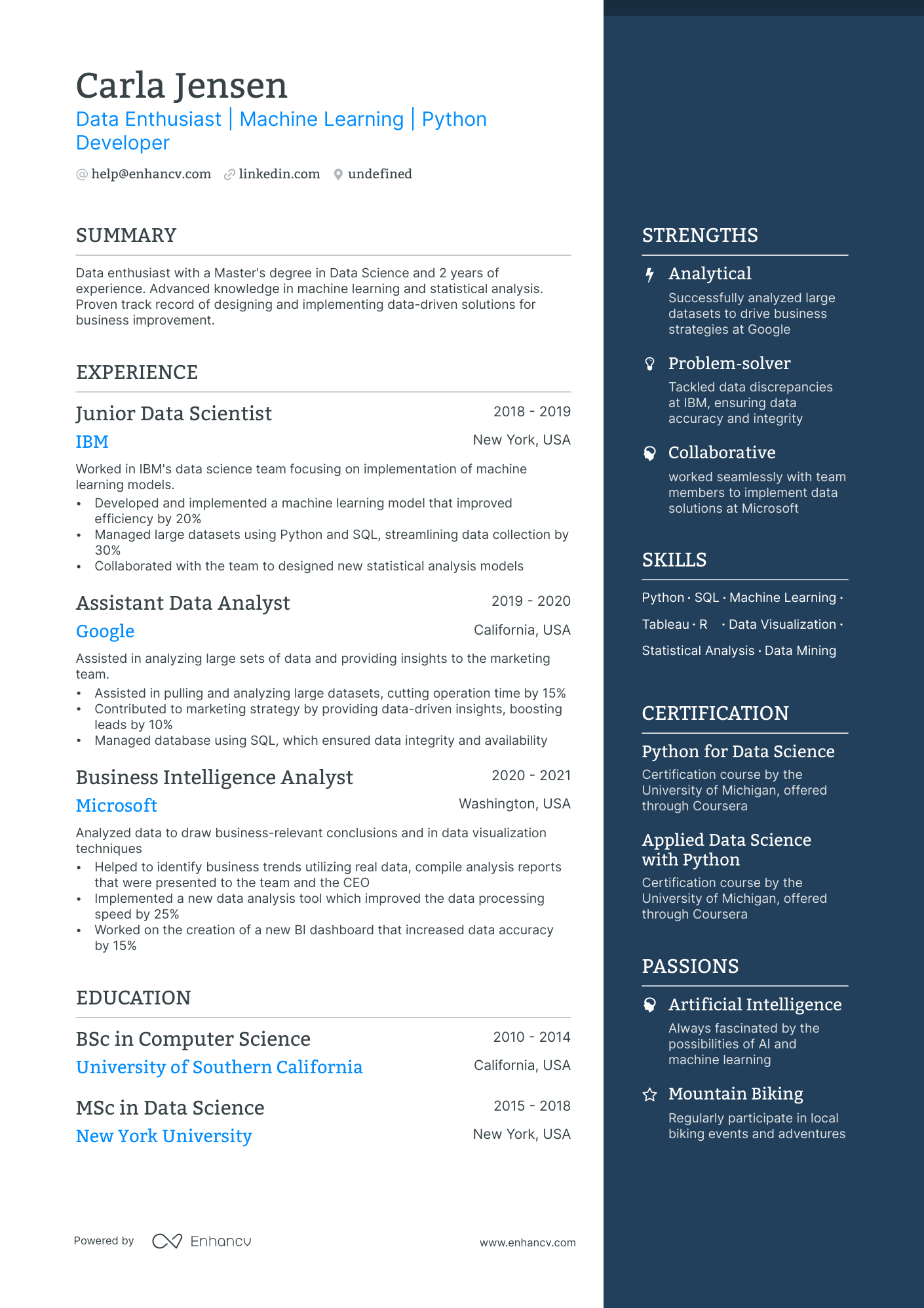One of the primary challenges faced by Entry-Level Data Scientists is a lack of professional experience, which can make their resume seem less compelling compared to those of experienced candidates. Our guide can assist in this respect by offering strategies on how to emphasize transferable skills, relevant academic projects, and any internships or volunteer work that demonstrate your potential as a data scientist.
Dive into this guide to learn how to craft a entry-level data scientist resume that offers recruiters a clear view of your career journey:
- Draw from our entry-level data scientist resume samples, highlighting top skills, certifications, and more.
- Illuminate the potential impact you can bring to an organization through your resume summary and experience.
- Spotlight your unique entry-level data scientist expertise, emphasizing tangible results and standout achievements.
Recommended reads:
Crafting a stellar entry-level data scientist resume format
Navigating the maze of resume formatting can be challenging. But understanding what recruiters prioritize can make the process smoother.
Wondering about the optimal format, the importance of certain sections, or how to detail your experience? Here's a blueprint for a polished resume:
- Adopt the reverse-chronological resume format. By spotlighting your latest roles upfront, you offer recruiters a snapshot of your career trajectory and recent accomplishments.
- Your header isn't just a formality. Beyond basic contact information, consider adding a link to your portfolio and a headline that encapsulates a significant achievement or your current role.
- Distill your content to the most pertinent details, ideally fitting within a two-page limit. Every line should reinforce your candidacy for the entry-level data scientist role.
- To preserve your resume's layout across different devices and platforms, save it as a PDF.
Upload your resume
Drop your resume here or choose a file. PDF & DOCX only. Max 2MB file size.
Pro tip
Consider incorporating design elements like icons or charts to enhance your resume's visual appeal and readability. But remember, the key is subtlety; don't let design overshadow content.
Essential components for your call center customer service resume:
- Header: Feature your name prominently. If you have a notable degree or certification, append it next to your name. Include contact details, a link to your portfolio, and a concise headline.
- Summary or Objective: Align your professional trajectory and standout achievements with the desired role.
- Experience: Craft concise bullet points, highlighting tangible successes and contributions.
- Skills: Showcase them throughout your resume and consider a dedicated sidebar for emphasis.
- Education & Certifications: Reinforce your credibility and demonstrate your commitment to the industry.
What recruiters want to see on your resume:
- Academic Qualifications: A degree in relevant fields such as Computer Science, Statistics, Data Science or a related quantitative discipline.
- Technical Skills: Proficiency in data science tools and programming languages such as Python, R, SQL, Hadoop, SAS etc. Experience in machine learning algorithms and statistical analysis is highly desirable.
- Data Management: Demonstrable experience with handling, cleaning, and preprocessing a variety of data types – structured and unstructured data.
- Problem-Solving Abilities: Evidence of using analytical skills to solve complex problems, which could be demonstrated through projects, coursework, or internships.
- Communication Skills: The ability to distill complex results into clear, understandable language and visualizations for non-technical stakeholders.
Recommended reads:
Detailing your relevant experience on your entry-level data scientist resume
Showcase your credibility in the resume experience section. For an effective entry-level data scientist resume:
- Highlight measurable achievements.
- Scan the job advert for keywords and integrate them throughout your experience section.
- Emphasize your technical proficiencies and how you've applied them in various roles.
- Keep it simple: mention your responsibility, relevant skills, and the outcomes.
- Use this section to convey your unique value, soft skills, feedback received, and the type of company culture you thrive in.
Top professionals ensure their experience section offers a captivating look at their expertise. Check out our sample entry-level data scientist resumes for guidance.
- Developed machine learning models to analyze customer data, resulting in a 15% increase in sales.
- Implemented data preprocessing techniques to clean and transform raw data for analysis.
- Collaborated with cross-functional teams to identify business needs and provide data-driven solutions.
- Utilized Python and R programming languages for data exploration, visualization, and statistical analysis.
- Conducted A/B testing to evaluate the effectiveness of new features, leading to a 10% improvement in user engagement.
- Performed exploratory data analysis on large datasets to identify patterns and insights.
- Developed predictive models using regression and classification algorithms to optimize marketing campaigns.
- Collaborated with software engineers to develop automated data pipelines, reducing data processing time by 30%.
- Used SQL to extract and manipulate data from relational databases.
- Presented findings to stakeholders through data visualizations and reports, facilitating strategic decision-making.
- Built and maintained databases to store and organize large volumes of customer data.
- Conducted statistical analysis to identify trends and patterns in market research data.
- Designed and implemented data visualization dashboards using Tableau for monitoring key performance indicators (KPIs).
- Collaborated with software developers to integrate machine learning algorithms into production systems.
- Provided data-driven insights and recommendations to improve operational efficiency, resulting in a 20% cost reduction.
- Developed and deployed predictive models for fraud detection, reducing fraudulent transactions by 25%.
- Implemented natural language processing techniques to analyze customer feedback and sentiment, improving product satisfaction by 15%.
- Collaborated with cross-functional teams to design and optimize data pipelines for real-time data processing.
- Used Python libraries like TensorFlow and PyTorch for deep learning model development.
- Led a team of junior data scientists, providing mentorship and guidance for their professional growth.
- Developed machine learning algorithms to analyze social media data and identify trending topics.
- Used natural language processing techniques to extract key information from unstructured textual data.
- Collaborated with marketing teams to develop personalized recommendation systems, increasing click-through rates by 20%.
- Implemented data visualization dashboards using D3.js to present insights to stakeholders.
- Conducted hypothesis testing to evaluate the impact of new features on user engagement, resulting in a 12% improvement.
- Developing and implementing machine learning models to optimize supply chain operations.
- Utilizing big data technologies like Apache Spark for processing and analyzing large-scale datasets.
- Collaborating with cross-functional teams to identify areas for process improvement and cost reduction.
- Creating data pipelines to ingest, transform, and store data in cloud-based environments.
- Conducting exploratory data analysis and visualizations to uncover insights and trends.
- Developed and optimized recommender systems using collaborative filtering algorithms.
- Implemented time series forecasting models to predict customer demand, resulting in a 10% reduction in inventory costs.
- Collaborated with software engineers to deploy machine learning models into production systems.
- Performed feature engineering and selection to improve model performance and interpretability.
- Conducted A/B testing to evaluate the impact of different pricing strategies on customer purchase behavior.
- Performed data cleaning and preprocessing tasks to ensure data quality and consistency.
- Developed and implemented clustering algorithms to segment customer populations for targeted marketing campaigns.
- Collaborated with business analysts to define key performance indicators and develop metrics dashboards.
- Used Python and SQL for data manipulation, analysis, and visualization.
- Provided actionable insights through data-driven presentations and reports to support strategic decision-making.
- Built and deployed predictive models for customer churn prediction, resulting in a 20% decrease in attrition rate.
- Performed data mining and feature engineering on large-scale datasets to extract valuable insights.
- Collaborated with software engineers to integrate machine learning models into real-time recommendation systems.
- Used Python libraries like scikit-learn and XGBoost for model development and evaluation.
- Presented findings to stakeholders through interactive dashboards and visualizations.
- Conducted statistical analysis on financial data to identify patterns and anomalies.
- Developed risk assessment models using regression and classification techniques.
- Collaborated with software developers to implement data analytics solutions for investment portfolios.
- Generated data-driven reports and presentations for executive management.
- Provided data support and insights for strategic decision-making processes.
Quantifying impact on your resume
<ul>
Crafting the experience section for novice entry-level data scientist candidates
Lack of extensive experience doesn't equate to an empty resume. Here's how you can enrich your experience section:
- Volunteer Roles: Community involvement often equips you with valuable interpersonal skills, and sometimes even technical ones, relevant to the job.
- Academic Projects: Highlight significant university projects that contributed to the field, showcasing your hands-on experience.
- Internships: Even short-term internships can be invaluable. If they're pertinent to the role, they deserve a spot on your resume.
- Past Jobs: Even if unrelated to the entry-level data scientist, these roles can demonstrate transferable skills that are beneficial for the position.
Recommended reads:
Pro tip
Your experience section should be a testament to your professional growth. If your career journey isn't particularly linear or impressive, focus on detailing specific skills and the tangible outcomes of your responsibilities.
Highlighting your hard and soft skills on your entry-level data scientist resume
The skills section of your entry-level data scientist resume should showcase your capabilities that align with job requirements.
Your hard skills, or technical skills, demonstrate your proficiency with technological innovations and specific software. On the other hand, your soft skills illustrate how you'd excel in the workplace environment with personal attributes like resilience, negotiation, and organization.
For a well-rounded entry-level data scientist resume, it's essential to include both. Here's how to craft a standout skills section:
- Prioritize skills listed at the top of the job advert.
- Highlight unique skills you've honed over time.
- Choose soft skills that resonate with the company or department culture.
- Address essential job requirements by listing key skills for the entry-level data scientist role that haven't been mentioned elsewhere in your resume.
Check out our sample skill list for entry-level data scientist to get ideas on the most sought-after hard and soft skills in the industry.
Top skills for your entry-level data scientist resume
Python
R Programming
SQL
Machine Learning
Data Visualization
Statistical Analysis
Big Data Processing (e.g., Hadoop and Spark)
Deep Learning
Knowledge of Cloud Platforms (AWS, Google Cloud, Azure)
Proficiency in Software such as Jupyter Notebooks/Tableau
Problem-solving
Communication
Critical Thinking
Teamwork
Organizational Skills
Attention to Detail
Creativity
Adaptability
Time Management
Decision-Making
Pro tip
Targeting the needed job ad skills doesn't have to end with the skills section. You can talk about your related certifications, interests or additional experience via projects or volunteering, where you picked up those skills, too.
The importance of your certifications and education on your entry-level data scientist resume
Pay attention to the resume education section . It can offer clues about your skills and experiences that align with the job.
- List only tertiary education details, including the institution and dates.
- Mention your expected graduation date if you're currently studying.
- Exclude degrees unrelated to the job or field.
- Describe your education if it allows you to highlight your achievements further.
Your professional qualifications: certificates and education play a crucial role in your entry-level data scientist application.
They showcase your dedication to gaining the best expertise and know-how in the field.
Include any diplomas and certificates that are:
- Listed within the job requirements or could make your application stand out
- Niche to your industry and require plenty of effort to obtain
- Helping you prepare for professional growth with forward-facing know-how
- Relevant to the entry-level data scientist job - make sure to include the name of the certificate, institution you've obtained it at, and dates
Both your certificates and education section need to add further value to your application.
That's why we've dedicated this next list just for you - check out some of the most popular entry-level data scientist certificates to include on your resume:
Best certifications to list on your resume
Pro tip
If you have basic certificates, place them in the skills or experience section. This saves space for high-demand industry certificates.
Recommended reads:
Should you add a summary or objective to your entry-level data scientist resume?
Choose between:
- Resume summary to match job needs with your top wins.
- Resume objective to share your career goals.
Both should tell recruiters about your best moments. Keep them short, around five sentences. Check out our sample structures for guidance.
Resume summary and objective examples for a entry-level data scientist resume
- Entry-level data scientist with a Master's degree in Computer Science and a 6-month co-op experience in data analysis at XYZ Tech. Skilled in Python, R, SQL, and machine learning algorithms, I've managed to boost ad campaign efficiency by 30% through predictive analytics during my tenure.
- Analytics-focused professional with 1-year experience in a business intelligence role. Equipped with skills in Python, SQL, and Tableau. Successfully led a project that integrated BI tools into company processes, resulting in a 20% increase in operational efficiency. Eager to transfer these skills into the field of data science.
- A driven graduate with a Bachelor's in Physics, I bring strong analytical skills and a knack for problem-solving. With a demonstrated competency in Java and MATLAB, I have successfully designed and implemented a simulation model that helped optimize particle trajectory predictions during my final year project.
- As a seasoned financial analyst with 5 years of experience in quantitative roles, I am proficient in using SQL, Python, and Excel. My success in identifying investment opportunities that returned 15% above market rates demonstrates my data-driven decision-making skills. Keen on leveraging this background to transition into a data science career.
- Seeking an entry-level opportunity as a Data Scientist where I can utilize my knowledge of machine learning and statistical modeling, acquired through a rigorous academic curriculum in Statistics and internships. Passionate about the power of data in driving strategic decision-making and looking forward to facing challenging problems.
- Fresh Computer Science graduate aiming to apply my theoretical knowledge in big data, AI, and cloud platforms to real-world problems as an Entry-Level Data Scientist. I am eager to contribute with my strong foundation in software engineering, combined with my enthusiasm for data pattern identification and problem-solving techniques.
Additional sections to elevate your entry-level data scientist resume
Recruiters often seek candidates who offer more than just the basics.
To stand out, consider adding:
- Interests: Share hobbies or activities that reveal your personality and transferable skills.
- Projects: Highlight innovative work that showcases your expertise.
- Languages: If communication is vital for the role, showcase your linguistic abilities.
- Awards: Feature significant recognitions that underscore your expertise.
Key takeaways
- Format your entry-level data scientist resume for clarity and coherence, ensuring it aligns with the role.
- Highlight key sections (header, summary/objective, experience, skills, certifications) within your entry-level data scientist resume.
- Quantify achievements and align them with skills and job requirements.
- Feature both technical and personal skills across your resume for a balanced portrayal.




